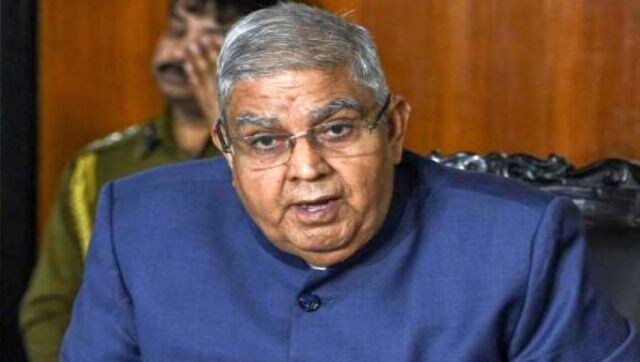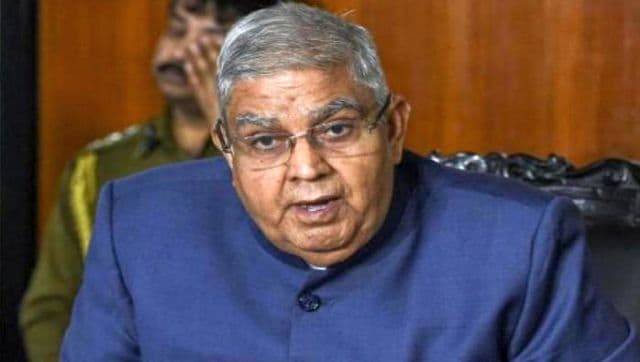West Bengal governor Jagdeep Dhankhar’s move comes even as a bill nominating Chief Minister Mamata Banerjee as the chancellor of state-run varsities awaits his mandatory nod

File photo of West Bengal governor Jagdeep Dhankhar. PTI
West Bengal governor Jagdeep Dhankhar and the government of Chief Minister Mamata Banerjee are at loggerheads again.
Dhankhar on Thursday announced that he had appointed Mahua Mukherjee as the next vice-chancellor of Rabindra Bharati University (RBU).
Mukherjee is a professor in the department of dance of RBU.
The governor also attached a recommendation of the government search committee for the post and said that he was choosing Mukherjee, whose name topped the list.
The term of the current RBU vice-chancellor Sabyasachi Basu Roy Choudhury is set to end imminently. While Basu Roy Choudhury could not be contacted, a source close to him he was not willing to extend his tenure.
Let’s take a look at why this move is bound to create more friction
This is just the latest salvo in a long-running feud between Jagdeep Dhankhar and the state government led by Mamata Banerjee, which has accused the governor of acting as ‘an agent’ of the Centre.
The governor’s move comes even as a bill nominating Banerjee as the chancellor of state-run varsities awaits his mandatory nod.
The governor is currently chancellor of the state-run universities by dint of his office.
The Bengal government’s bill refers to the report of the Punchhi Commission, which was set up by the Centre under the chairmanship of former chief justice of India Madan Mohan Punchhi, in 2007 to look into changing scenarios and new issues relating to Centre-state relations.
The West Bengal Assembly in June had passed the bill amid opposition by the BJP legislators.
The bill was passed after 182 members voted in favour of the legislation and 40 against it in the 294-member Assembly.
As per Hindustan Times, Dhankhar hinted that he could send the bill back to the House or refer it to the Centre. Education is part the Concurrent List of Constitution’s Seventh Schedule, which effectively means both the Union and the state have the power to bring legislation on the subject. In case of a conflict, the Centre’s law will prevail, as per the report.
Dhankhar had in December claimed that appointments of vice-chancellors of 24 universities in the state were made without his approval.
“VCs of 24 Universities appointed by Mamata Banerjee in disregard of law. These are ex facie in defiance of specific orders or without approval by Chancellor-the Appointing Authority,” the Governor had tweeted. “These appointments carry no legal sanction and would be forced to take action unless soon recalled,” he added.
TMC cries foul
TMC state spokesperson Kunal Ghosh said, “The governor has once again proved he does not believe in democratic principles and federalism.”
“While his consent is awaited for the bill passed by West Bengal Assembly appointing the chief minister as chancellor of the state universities, the hon’ble governor hastily announced a name as the VC of RBU. He did not bother to take into confidence the education minister and chief minister before the announcement. He is exceeding his brief,” Ghosh said.
“There is no need to be surprised because this governor never showed any respect for an elected government,” TMC’s Rajya Sabha member Santanu Sen told Hindustan Times.
“A person who addresses the media with BJP leaders by his side cannot be called neutral.”
What do experts say?
Amal Mukhopadhyay, former principal of Presidency College and a Constitution expert, told Hindustan Times Dhankhar has not violated any law.
“Since the governor has not given his assent to the bill, he is still the chancellor of RBU and other universities. Also, he selected a candidate from a list of three persons recommended by the search committee,” said Mukhopadhyay.
An editorial in The Hindu noted that the original intent of making Governors hold the office of Chancellor and vesting some statutory powers on them was to insulate universities from political influence.
“Even in the 1980s, as noted by the Justice RS Sarkaria Commission, the use of discretion by some Governors in some university appointments had come in for criticism. It acknowledged the distinction between the Governor’s constitutional role and the statutory role performed as a Chancellor, and also underlined that the Chancellor is not obliged to seek the government’s advice. However, it did say there was an obvious advantage in the Governor consulting the Chief Minister or the Minister concerned,” the editorial noted.
“The time may have come for all states to reconsider having the Governor as the Chancellor. However, they should also find alternative means of protecting university autonomy so that ruling parties do not exercise undue influence on the functioning of universities,” the editorial noted.
A piece in Moneylife called for entirely depoliticising the process.
“The commission on Centre-State relations had recommended that the Governors must not be burdened with powers which invite public criticism or controversies. The Constitution does not envisage the Chancellorship position for Governors. Therefore, they must not be loaded with it. The office of the Governor, as per the Constitutional mandate, is not in complete sync with the statutory position,” the piece noted.
The piece added that the Constitution does not envisage the Chancellorship position for Governors. Therefore, they must not be loaded with it. The office of the Governor, as per the Constitutional mandate, is not in complete sync with the statutory position.
“Fostering ideas and academic growth is urgently needed to depoliticize educational spaces. The National Education Policy, 2020 has pressed on this node for giving more autonomy to academic institutions. The concentration of power in the hands of either governors or CMs that may not have much to do with forwarding the goals of education in these institutions has led to the current travesty of education. The idea must be to concentrate powers in a much more democratic fashion with autonomy to universities. Until then, the Indian aspiration of dominating higher education will remain a dream,” it concluded.
With inputs from agencies








More News
Vegetable prices to remain high until June due to above-normal temperature | India News – Times of India
Lok Sabha Phase 2 Elections: Policeman On Poll Duty Kills Himself With Service Weapon In Chhattisgarh
SC verdict on VVPAT big blow to those who wanted to loot ballot boxes: PM Modi | India News – Times of India